*Disclaimer: This post is part of a content series sponsored by Camping World. All opinions are our own.
Recently, we had the pleasure of leading multiple seminars at the Colorado RV Travel and Adventure show in Denver, CO. Throughout the weekend, we had the chance to talk “shop” with many current and prospective RV owners. While we were asked lots of different questions, there were a couple that people asked over and over again. They weren’t always worded the same, but they were all centered around how to overcome the challenge of finding the right RV.
If you have ever purchased an RV, you probably remember that feeling of overwhelm. There’s so many types, sizes, specs, features, floor plans, options, and a million other things – it can seriously make your head spin! With all of that going on, it can be easy to end up purchasing an RV that isn’t the right one for you and your situation.
Luckily for you, we’ve already made several many mistakes for you that you can learn from so that doesn’t happen to you. We have now had 3 different RVs since we hit the road as full-timers in 2017. With those mistakes comes experience and, hopefully, wisdom. In this post, we are going to share the lessons we’ve learned and provide you with some things to consider so that you can purchase the right RV the first time.
The Perfect RV?
Before we go any further, let me just share something we’ve slowly learned that is important for you to understand. There is no perfect RV out there. There is no perfect size, floor plan, combination of features etc. that is a one-size-fits-all solution. If there were, every RV manufacturer would make the same thing, and I think we can agree that would be terribly boring.
All you can try to do when buying an RV is find one that is perfect for you. One that fits you and your family. One that fits into your budget and one that has the features you needed, even if it doesn’t have everything you wanted.
Our Experience
RV #1: 2005 Forest River Rockwood Fifth-Wheel
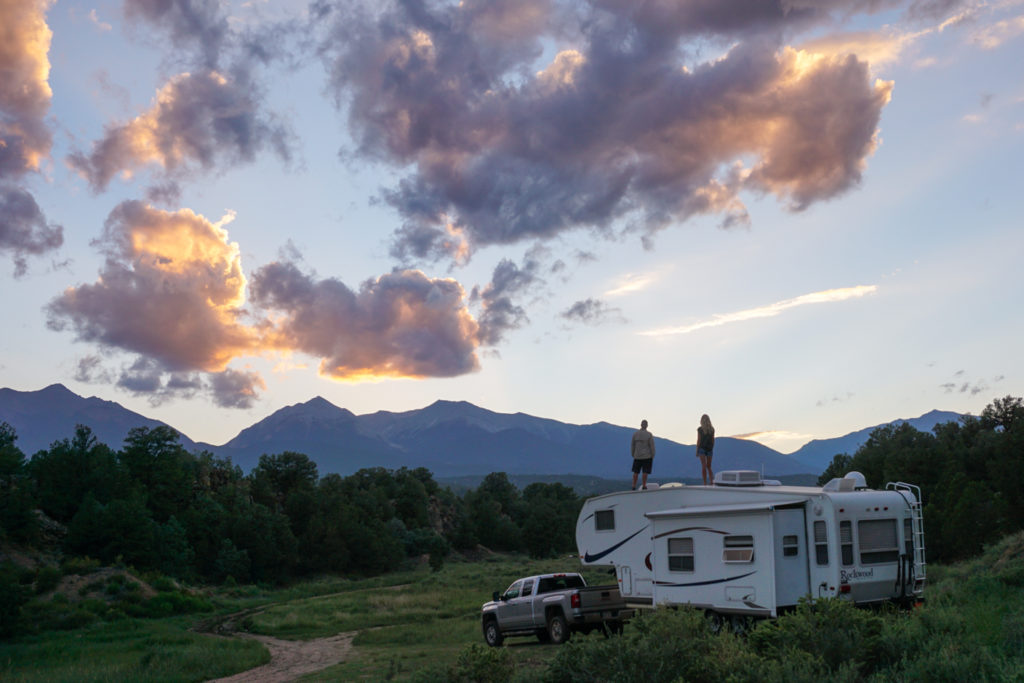
As we mentioned, we hit the road in 2017 full-time as part of “following our detour”. You can read our whole story, if you’d like. At that time, though, we had no clue what we were doing and had never RVed before. Additionally, I had to quit my job in order to go for the RV lifestyle. Those two factors meant we didn’t want to invest a lot in an RV because for one, we didn’t know if we’d even like it and also we hit the road before I started working again so we had to be financially smart.
Our primary goal with our first RV was finding something that fit our budget that was nice and reliable enough. A fifth-wheel at that time seemed like a great option because we could buy it used but purchase a new truck to pull it with so we wouldn’t have to worry about engine issues on the road, which was a big fear of ours when it came to buying used within the tight budget we had.
What We Loved:
- We were able to pay cash and not worry about a monthly payment
- The layout was great and the space was very comfortable. We did a slight remodel to make it feel more like home and since it was 30 feet long, we had plenty of room and it wasn’t too hard to transition from living in a house to an RV. For this reason, fifth-wheels are a great option for full-timing.
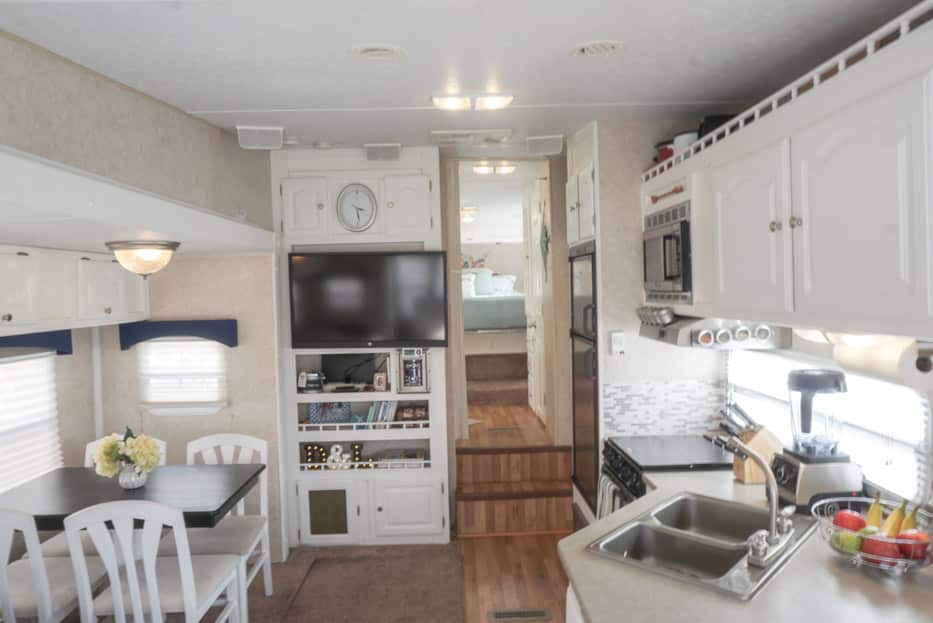
Why We Switched:
- We didn’t know how often we’d be traveling when we hit the road and it took us a bit to find our pace, but we got to where we were traveling to a new destination every week. Towing long distances, setting up our campsite, and then hitching up days later and doing it all over again got really tiring.
- Travel days were stressful. We’d have to pack snacks to bring in the truck for the ride, stop often for restroom breaks and with our total length we could only fit into truck stops. Additionally, we typically couldn’t pull over at scenic overlooks or roadside attractions because parking was a challenge. Lastly, towing a fifth-wheel isn’t hard but can certainly get tiring, especially with how often we were traveling.
RV #2: 2018 Winnebago Navion 24D Class C Motorhome
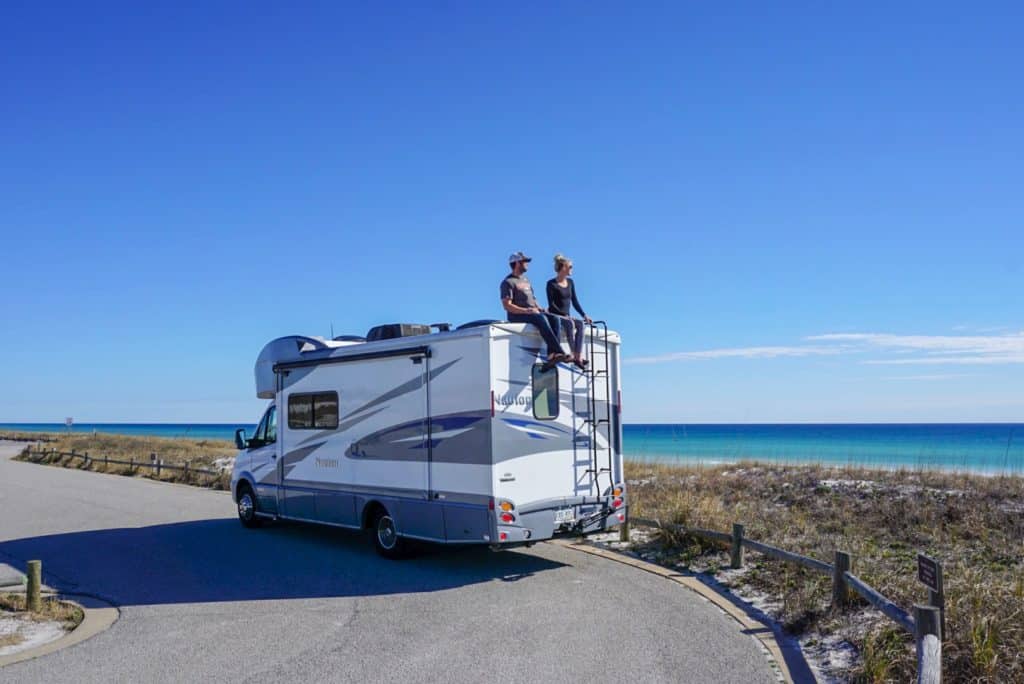
After six months with our fifth-wheel we knew we were ready to invest a bit more in a new RV. We were loving the lifestyle and could see ourselves doing it for a long time. I was finding work I could do on the road and we found out about ways we could save money on the road. We had also learned a thing or two about our travel style.
What We Loved:
- Easy, get-in-and-go travel. This RV felt like it was made for us during the second phase of our RV travels. We drove all over the country in our Navion (even up to Canada and down to the Mexico border to Big Bend National Park) and it kept up with our fast-paced adventure lifestyle. Travel days were a breeze, we could switch off driving and cover long distances with ease and comfort because we could have access to both our kitchen and our bathroom. We could also pull off and find parking nearly anywhere we wanted to stop – the grocery store, busy downtown areas, you name it, we’ve parked there.
- Quality and comfort. Being a brand new RV, we didn’t have as many little repairs to do as we did on our fifth-wheel and since it was a higher end model, the build quality was noticeably better. The layout, surprisingly, was very livable and spacious for being only 26 feet long. The murphy bed with a couch underneath made the space very functional and open.
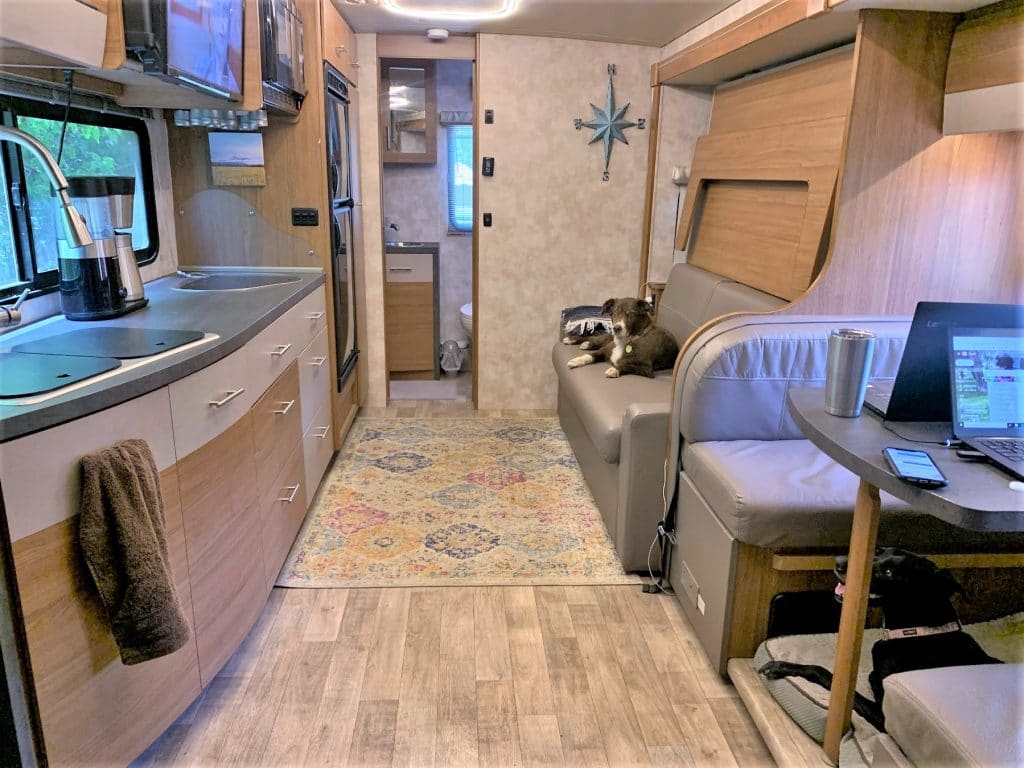
Why We Switched:
- Our traveling slowed down dramatically in 2019 when we chose to return home to care for a family member and start the adoption process to grow our family. At that point, the high monthly payment didn’t make sense for us if we were only taking trips here and there. We weren’t sure our RVing future with so many family matters up in the air.
RV #3: 2020 Thor A.C.E. 30.3 Class A Motorhome
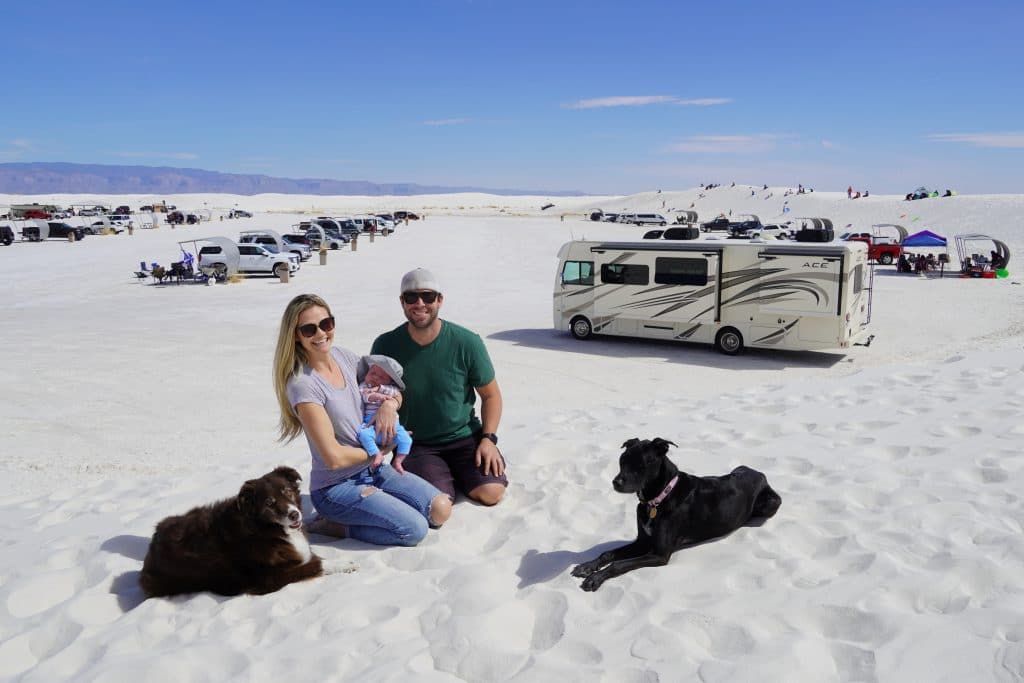
In 2021 we were blessed with our son Myles and after taking time off from RVing and learning how to live in a global pandemic, we were so anxious to get back on the road. We knew we were going to need something a bit more kid-friendly. We also knew that having a baby along for our travels would certainly be a big change for us. That fast-pace, travel every week style wasn’t going to work and we pictured ourselves doing less adventuring and more relaxing with baby at the campsite.
What We Love:
- The “extras”, as we would call them, after living in the smaller class C for two years. We enjoyed having extra space with a baby and two dogs. We were also happy to have a private bedroom area with a door, so that if one of us was on a work call and our son was cranky or napping, we could have that separation. There are also other “extras” we love like an outdoor kitchen and added storage for outdoor gear to make our campsites more comfortable (outdoor mat, propane fire pit, comfy chairs, tables, grill, etc.)
Why We May Someday Switch:
We spent five months of our son’s first year on the road, so it was everything we needed during that season. However, we may find ourselves not doing as much RV traveling as he continues to grow, which would make having a class A much more than we would need for occasional camping trips. We’ll see what the future holds, though.
Getting Started Finding the Right RV…For YOU
Before deciding on an RV or really even browsing RVs, you really want to consider these factors:
- Why do you want an RV? There are lots of different uses for RVs, not just travel.
- How will you use it? For full-timing or weekend trips in the summertime? Something in between? Are you a glamper who will primarily stay at RV parks and resorts or a hard-core camper who will go off grid?
- When will you use it? Only in warm weather or year round?
- Who is going to use it? Think of now and possibly in the near future. What sleeping arrangements will you need?
- What is your travel style and what type of hobbies and activities do you want to enjoy while RVing? Try to determine how fast or slow you’ll travel and how much storage you’ll need for your gear.
What is Your Budget?
This is an important thing to consider aside from the questions above, because your budget will likely have the biggest influence on what you can purchase. You’ll need to determine, based on your budget, if you’ll be in the new or used market.
Remember, when it comes to the cost of an RV, you have to think about the whole RV setup. This means you need to include the vehicle you’ll need to tow it with or tow behind it. With that comes towing equipment, such as hitches, braking systems, a tow bar, etc.
You’ll have other costs in addition to your RV setup as well. Below are some examples of upfront costs and recurring costs you’ll need to account for in using your RV.
There’s must-have gear you’ll need to operate the RV, such as hoses and levelers. You’ll also need to stock it with all the interior items, like kitchen supplies, linens, storage solutions, and exterior living items can all add up quickly. Recurring costs are variable, depending on your use. If you plan to use your RV a lot, definitely look into memberships that can save you money on accommodations and fuel.
The important thing is that you don’t overextend yourself. You don’t want to purchase an RV that you can’t afford to enjoy!
Different Types of RV’s
There are two main categories of RVs: motorized and towable. Motorized, also called motorhomes, have all the living and driving functions are all under one roof. Towable RVs require a vehicle to tow them but are towed in different ways.
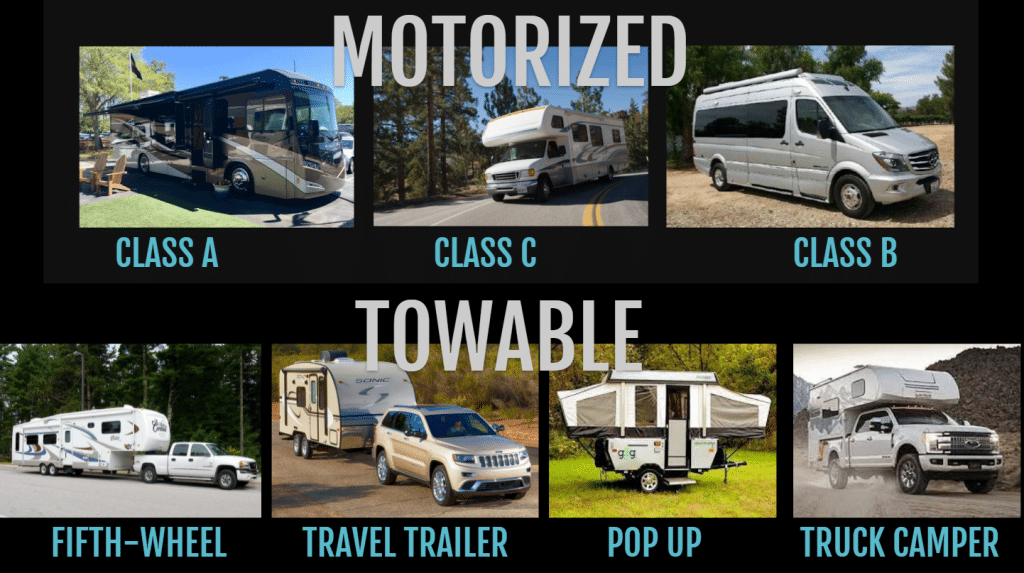
One type of RV that is not shown in the image above is toy haulers. That is because toy haulers can come as a motorized or towable RV, although most commonly are towable. Toy haulers have a garage in the back with a ramp for toys like ATVs and motorcycles.
Towable vs. Motorized RVs
There are several pros and cons when it comes to deciding between towable and motorized. Generally speaking, motorized RVs tend to be more expensive. They also tend to be a bit easier to set up at your RV site since there is no unhitching to do, unless you tow a vehicle behind you. But those shorter in length may not even require an additional vehicle. Travel days in motorized RVs are more convenient since you have better access to your belongings, kitchen, and bathroom.
Towable RVs, however, can offer more comfortable living space, especially fifth-wheels with the higher ceilings and stairs that help separate living areas. They also require less maintenance since they do not have engines, although your tow vehicle does.
Deciding between the two really comes down to preference and what the highest priority is for you and your travel style. This is where you’ll need to heavily rely on the factors we covered first in this post (how you plan to use it, where you plan to do, who will use it, what type of RVer you are, etc.).
What Size RV Do I Need?
For most people just getting started RVing, they don’t have enough experience to know how the length or size of their RV will impact them. Overall size and length is a common reason people switch into different RVs, as you can see from reading about our personal experience with three different RVs in five years.
Ultimately, when it comes to size and length, your family size and the way you plan to use it are the single biggest factors that you should consider. Family size is pretty straight forward – the more people you need to sleep, the more length you will have – but the way you plan to use it and how the length of the RV may impact you is a little less clear. Below are some ways that the length of your RV might directly affect the way you can or want to use your rig.
The longer your RV…
- The harder it is to find RV sites. Many RV parks and campgrounds just aren’t built with enough space for 40ft and up sites, especially state and national parks, which also may have narrow roads that will be tough to navigate in a longer RV. When booking reservations, you’ll need to pay close attention to the length restrictions.
- The harder it is to be spontaneous. Part of the fun of RVing is being able to stop when you are driving along and see something you want to enjoy – a roadside attraction, a beautiful overlook, wildlife, etc. But having a rig that is longer will make it sometimes impossible to pull off depending on the parking situation.
- The harder it is to boondock. Public lands are unpredictable, you never know how much space you’ll have or what the conditions of the roads will be. The longer your RV, the harder it can be to find ample space to park and the harder it is to access boondocking sites.
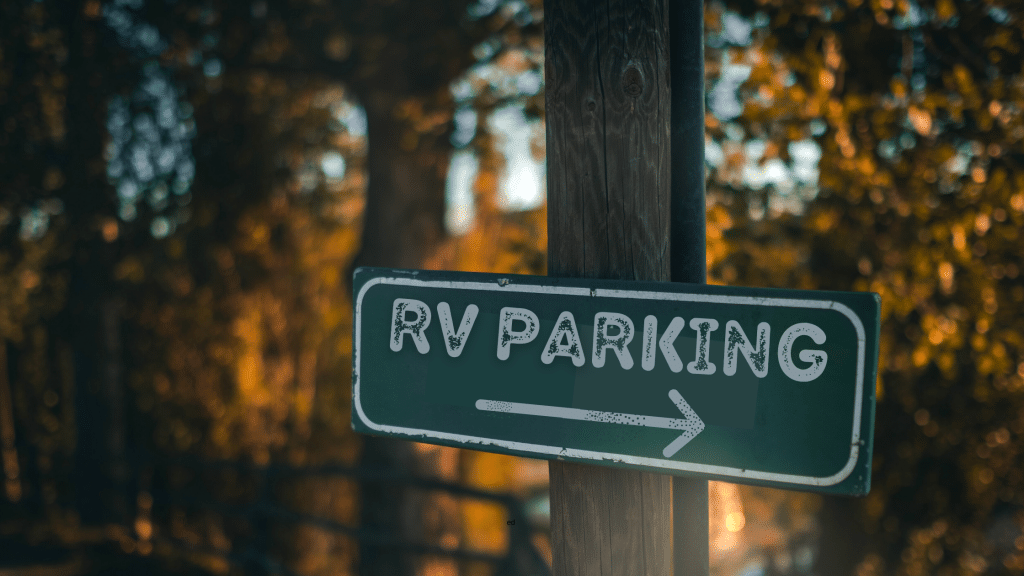
Taking the Next Steps
Once you have a good understanding of how you will use the RV in terms of who all will be staying in it, where you’ll be taking it, and what your anticipated travel style will be, you’re ready to start taking steps towards finding the right one.
Make a Checklist
What are your needs vs. wants? If you want to dry camp or “boondock” you will need larger holding tanks and maybe solar. But you may just want an outdoor television. Any floor plans you particularly like or amenities you’d prefer to have?
Include your budget on this list, as well as your requirements for weight and length. These requirements may be restricted to your tow vehicle and how much it can safely tow. Also, in terms of weight, you’ll want to know how much weight you can pack in your RV, taking into account the amount of people who will be in it and the gear you plan to take. Length will depend on what you’re comfortable with, but keep in mind that some RV parks and campgrounds (especially national parks) have length restrictions.
Do Your Research
Once you have our checklist, start browsing dealerships online and getting an idea of the makes and models that are a good fit for you. Research the different manufacturers and read reviews to get a good sense of their reputation. Another great resource is searching in RV owner Facebook groups. Most makes and models will have their own groups. In these groups, you’ll get more information about owner’s experiences than you will reading reviews because most of the time reviews are negative. You can ask questions in the group and connect with other RVers.
Try Before You Buy
Consider renting the type of RV you’re considering purchasing to try it out. Good Sam RV Rentals is a great way to do this because there is a wide variety of RV types, makes and models. It’s basically like Airbnb for RVs, whereas other rental companies have a standard RV type that is their entire inventory.
Renting is a great strategy for narrowing down what RV is right for you because you may not truly know what you need and want in an RV until you’re actually on the road using it. It’s hard to tell if you will be happy in an RV by just walking through it at a dealership.
Go Shopping!
Once you’ve narrowed it down and have a pretty good idea of the type of RV that is right for you, it’s time to go shopping. We recommend heading to your nearest Camping World because they are always in convenient locations all across the U.S. and have a huge inventory.
A few tips for shopping day:
- Bring everyone who will be staying in the RV to get a feel for the space. We even brought our dogs shopping with us and love that Camping World is dog friendly.
- Check EVERYTHING. If the dinette folds down into a bed, try it out. Stand in the shower. Lay down on the beds, Get cozy and see how every nook and cranny of the RV feels and works. Check the storage and don’t forget the small details too, like where outlets are.
- Take notes. You may look at so many RVs in one day that you’ll go home and forget what you saw and what you liked.
- Ask the salesperson lots of questions. There really are no stupid questions! They’ll be an incredible resource.
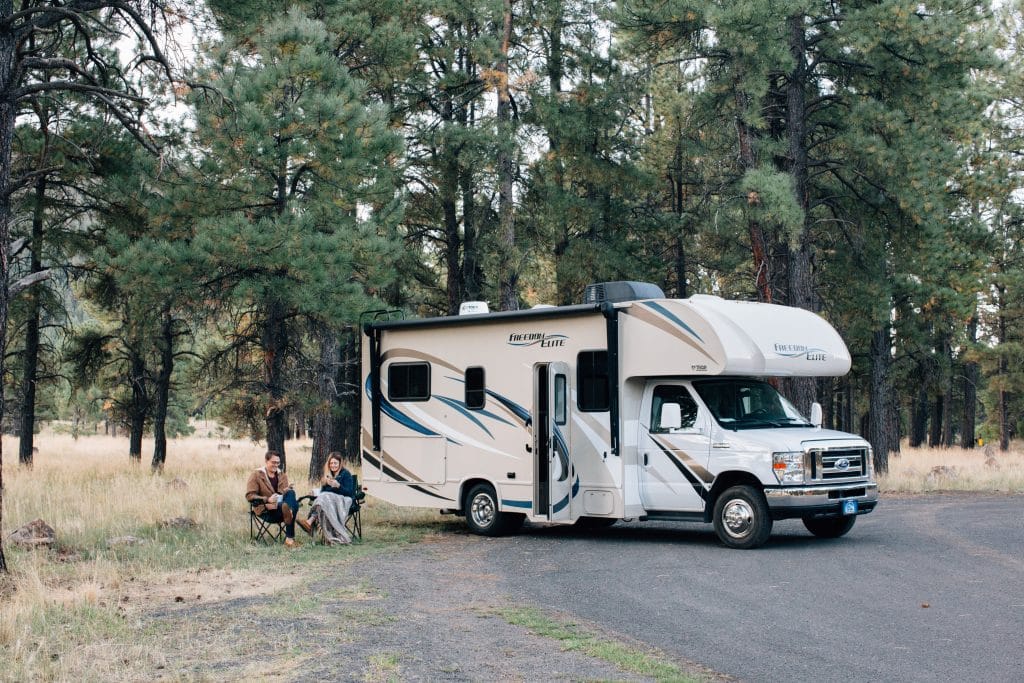
Conclusion
Remember, there is no perfect RV, it’s about finding the right one for you. The most important thing is that you know all the details of how you plan to use and find an RV that fits accordingly. Try not to get swept away with fancy new technology, design elements, or features you won’t use.
Things like layout, amenities that match the way you plan to use it, and your budget are far more important. Let us know if there’s any way we can help you find the right RV and hit the road.
Pin This Post For Later:
Related Posts:
Choosing the Right RV: Why We Switched From a Fifth Wheel to a Class C


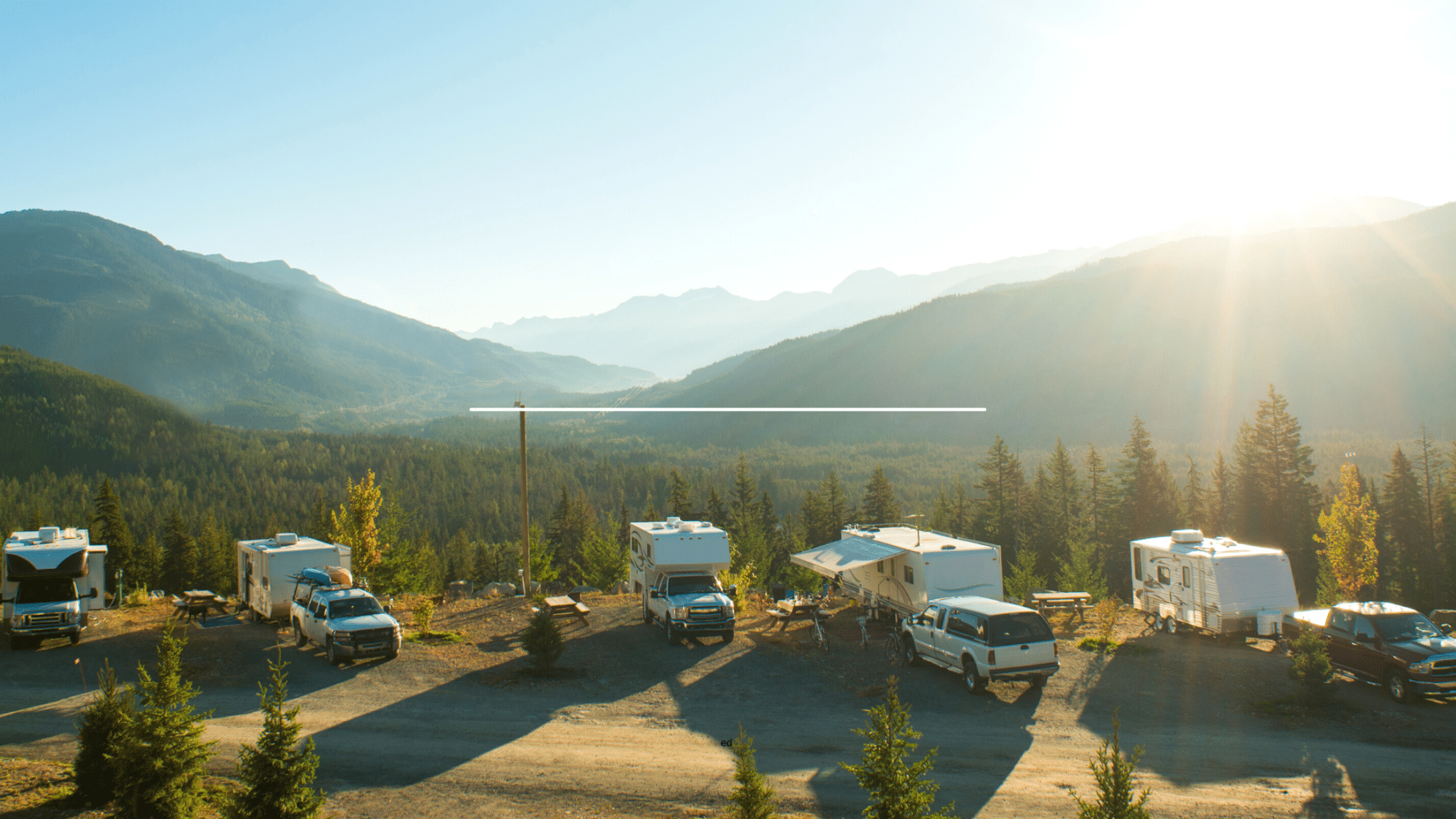

If you had to choose between class c and class b, which would you choose? I’m thinking of buying it just for me and my wife.
Hi Daniel, If we had to choose, we’d pick a a small class C (sometimes called B+) on a Sprinter chassis (like the Winnebago Navion) or on the Ford Transit (like the Thor Compass AWD). Not that much bigger of a footprint but significantly more space. Best of luck!